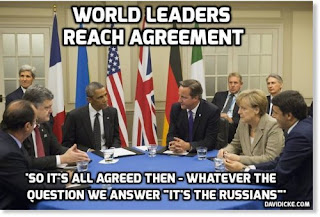Trump and Putin at Helsinki - story of (not) a treason
Presidents Trump
and Putin eventually had their first bilateral meeting, yesterday 07/16/2018 in
Helsinki [full video of the press conference]. Supposedly, the Summit was going
to set of a new course in the relationships between USA and Russia, marking the
inversion of the negative trend established during Obama’s Presidency. Many Trump’s
critics – in USA, most Democrat and Neocon politicians and commenters –
questioned the opportunity of the Summit itself. They reacted with outrage to
the final declarations that Trump released to the press, even going as far as
ousting Trump as a traitor to the USA1,2.
So, here we will look at facts and their implications. Was the Summit a
success for any party? Who got the best advantages? Can Trump count it as a victory
or was it a defeat? In which direction can we expect USA and Russia to evolve
their foreign politics?
First, of course, the meeting was an evident success of image for Russia
and a personal success of Vladimir Putin. It was a first step in obtaining what is his
stated goal, making Russia recognized as an equal among equals. Back in 2007, Putin
postulated that we need to overcome a bipolar or unipolar world order – as in
during or after the Cold War, respectively – to achieve a multipolar one3.
Indeed, that would mean to acknowledge the role of other world Powers; as a
side effect, USA would concede not to be the only Superpower anymore. Besides
his accommodating words to Putin, besides his apparent isolationist politic, is
Trump ready to make USA step down from their dominant role? So far, Putin’s
success from the Summit has been a formal one. USA and Russia mutual relationships
will have to improve, and foreign politics to change, before the success can
become substantial. It is not granted.
Then, what could jeopardize such a change? I think that the Summit was a
success for Trump too. Even if his tour in Europe was heavily criticized, he
was able to make clear several important points. Trump can and will
criticize allies if it is useful. Briefly:
i, he evidently considers NATO against Russia as an outdated concept to
be revised or removed; the polemic on how much money each State member of the
Alliance should invest in military is instrumental to this;
ii, he does not trust the European Union, as a non-entity where the Union
itself is less than the sum of its State members, with no clear leadership and indecisive
politics; and hence he supports Brexit;
iii, he can ignore prominent and vocal sides of USA politic,
intelligence and public opinion if they disagree with his choices, at least in foreign
politic; indeed, he did not give up to his goal to build more positive
relationships with Russia.
All these points for sure concurred in setting the mood of most Liberals
and Neocons already critic toward Trump. The third point was especially
triggered during the Summit, when Trump made clear that he did not believe the
reconstruction made by USA intelligence about Russian interference in 2016
American election. Such meddling is presented by Trump’s critics as a proven
fact – a dozen Russian people indicted by Robert Mueller made USA democracy
trip. If it was true, then USA democracy in 2016 was not very stable to begin
with – hardly Trump’s fault, even less Putin’s. In order to attack a President
they do not like, those many critics accept to slander American democracy. Then
they point out others as traitors.
Anyway, USA intelligence discovered the supposed Russian interference – it did, right? Investigations
are still ongoing, but Trump does not necessarily trust them. He still
considers some splinters of the intelligence as part of the ‘Deep State’ opposed
to his Presidency. The questionable conduct held by FBI officials like Andrew
McCabe4, James Comey5, Lisa Page and Peter Strzok6 can only make Trump’s doubts look justified. At the Summit, Trump was directly
confronted by the press over this – having to publicly and bluntly choose between cutting
loose his attempt to get better relationships with Russia or ignoring USA
intelligence outlook.
The time has come that making USA best interest does not coincide with
saving USA face. Divergent interests within USA agencies and politics are
leading to divergent plots developing. At this point, in the context of the
relationships with Russia, only one approach can prevail – bringing forth further attrite
or a distension. In his electoral campaign Trump insisted that he would work
for better relationships between USA and Russia. Now he is President and it is
his right and duty to act in that sense – if he is able to. So far, he did it by words. With Trump
being contested this hard by critics, politicians and media, facts may be
harder and longer to come. That would easily explain why Trump’s words and
manners to Putin have been so accommodating – he knew that, beyond those, he
will be unlikely to have anything else to give for some time.
References





Comments
Post a Comment